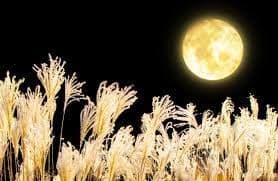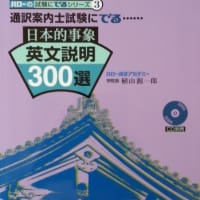
本日(9月10日)は、中秋の名月です。
本日(9月10日)は、中秋の名月で、昨年に続き今年も満月にあたるので、晴れていればとても美しいお月さまを見ることができそうです。
天気予報によりますと、今夜は、全国的に晴れる所が多いようですが、中国、四国や近畿は湿った空気の影響で雲が多く、局地的に雷雨や激しい雨が降りそうとのこと。また、東海や関東甲信は山沿いを中心に、にわか雨の所があるとのこと。沖縄はおおむね晴れるそうです。さて、あなたの住む場所では?
・本日の天気予報
https://weathernews.jp/s/forecast/
●昨年(2021年度)の第2次口述試験に「中秋の名月」が<プレゼン問題>で出題されました。
さて、昨年(2021年度)の第2次口述試験には、多くの日本文化に関する問題が出題されましたが、「中秋の名月」も【10:00~11:00】(その1)の<プレゼン問題>で出題されました。
30秒準備して約2分間のプレゼンテーションをする試験ですが、受験した皆さんの出来栄えはしかがでしたでしょうか。
●「中秋の名月」の出典(タネ本)
「中秋の名月」【10:00~11:00】の他に、七福神【10:00~11:00】、流鏑馬【11:00~12:00】、酉の市【11:00~12:00】、彼岸【13:00~14:00】、祇園祭【13:00~14:00】、七夕【14:00~15:00】、三寒四温【14:00~15:00】、鳥居【15:45~16:45】、年越しそば【15:45~16:45】、落語【15:45~16:45】などが、「ある出典(タネ本)」から出題されているのですが、ここでは、「中秋の名月」「七福神」「流鏑馬」「酉の市」の日本文と英文の説明を「タネ本」から抜粋してご紹介させていただきます。
━━━━━━━━━━━━━━━━━━━━━━━
2021年度に「タネ本」から出題された<プレゼン問題>例
━━━━━━━━━━━━━━━━━━━━━━━
●中秋の名月【10:00~11:00】(その1)
旧暦の8月15日モ現在の暦で9月中旬~下旬の満月の夜を「十五夜」、その日に出る月を「中秋の名月」といいます。
お月見は、ケイトウの花や月餅を供えて中秋の月を観賞する中国の唐代からの慣習にならい、日本独自の様式を整えた行事です。
里芋などの畑の収穫を祝う祭りだともいわれ、「芋名月」ともいわれます。
月の見える縁側に来スキを飾り、里芋、月見団子、酒、柿、栗、枝豆などを供え、月を眺めて秋の実りに感謝します。
The night of the full moon is called jugoya - August 15th on the old calendar or mid-September in today's calendar- and the moon that rises that day is called chushu no meigetsu (the harvest moon).
Otsukimi is an event which has added various unique Japanese styles to a custom that began during the Tang Dynasty in China where they made an offering of a cockscomb flower and Chinese mopn cakes (geppei) as they admired the harvest moon.
It is also said to be a festival to celebrate the harvest of the field, such as taro roots, and thus is also called imomeigetsu (potato harvest moon).
People give thanks for the autumn harvest as they admire the moon, and decorate the porch - in a place where the moon can be seen with Japanese pampas grass.
Then they make offerings of taro, tsukimi dango(moon viewing dumplings),sake, persimmons, chestnuts, or edamame (green soybeans) so that they can show gratitude to autumn harvests.
●七福神【10:00~11:00】(その2)
恵比寿、大黒天、弁天財、毘沙門天、布袋、福禄寿、寿老人を七福神といいます。
ヒンドユー教、仏教、道教、神道、土着信仰が融合して作られた神仏習合の神々で、福をもたらすとされます。
たとえば、恵比須は漁業と商売繁盛の神、大黒天は豊穣を担う神、弁財天は学問・芸能・美をつかさどる女神、毘沙門天は勝負事の神、などのいわれがあります。
日本には全国に七福神をまつる寺社があり、現代でも新年に7体の神様を順繰りにお参りする七福神詣の習わしが盛んです。
Ebisu, the god of fishe1y and merchants, Daikokuten, the god of wealth, commerce and trade, Benzaiten, the goddess of knowledge,art and beauty, Bishamonten, the god of warriors, Hotei, the god of abundance and good health, Fukurokuju, the god of happiness, wealth and longevity, Jurojin, the god of wisdom, are all together called the shichifukujin, the “seven deities of good fortune."
As elements of Hinduism, Buddhism, Shinto, and native beliefs merged to create a syncretistic fusion of religion in Japan, they are the gods believed to bring good fortune.
For example, Ebisu is the god of fishery and merchants, Daikokuten is the god of wealth, Benzaiten is the goddess of knowledge, art and beauty, and Bishamonten is the god of competition.
In Japan there are temples and shrines that enshrine the shichifukujin nationwide, and the custom of shichifukujin-mode, where people pay a visit to the seven gods one after the other around the time of the New Year, is popular to this day.
●流鏑馬【11:00~12:00】(その1)
流鏑馬は、射手が疾走する馬の上から連続で3つの的を目掛けて弓矢を引き放つ勇ましい行事です。
馬を走らせる区間を馬場といい、約220mが正式とされます。
的は50~60cmほどの四角い板で、馬の進行方向の左側に一定間隔を置いて3つの的が立てられています。
流鏑馬は平安時代に始まり、鎌倉時代から兵士の軍事訓練として盛んに行われるようになりました。
現代では、流鏑馬は全国の神社などの神事として催されます。
Yabusame is a courageous event where an archer on horseback aims at three targets lined in a row by shooting the bow and a arrow from a horse running at full speed.
The section within which the horse runs is called umaba(riding ground), and 220 m is said to be the proper length.
The target is a square board of about 50 - 60 cm and three of these targets are placed at fixed intervals on the left hand side of the horse's direction of movement.
Yabusame began in the Heian Period (794 - 1185), and it became popular as soldier's military drills during the Kamakura Period (1185 - 1333).
Today, yabusame takes place at Shinto shrines nationwide as a Shinto ritual.
●酉の市【11:00~12:00】(その2)
酉の市は、毎年11月の酉の日に各地の鷲(おおとり)(大鳥)神社で催される開運と商売繁盛の祭礼です。
古くは「とりのまち」と呼ばれて農耕道具の市でしたが、関東では商人の祭りとなりました。
浅草の鷲神社などでは福を掻き集める大熊手、おかめの面、入り船などの縁起物が売られ、たくさんの参詣人が訪れます。
Tori no ichi is a festival held on the Tori no Hi every November at shrines of otori (big bird) across Japan, wishing for good luck and a prosperous business.
In the old days it was called“tori no machi,”which was a market for farming tools, but in the Kanto region (the areas around Tokyo) it became a festival for merchants.
Many worshippers will visit places like Otori Shrine at Asakusau where various good luck charms such as okumade, a huge rake that is said to gather lots of' good fortune, an okame (a mask of a homely woman), and irifune (an incoming ship).
━━━━━━━━━━━━━━━━━━━━━━━
4冊の出典(タネ本)
━━━━━━━━━━━━━━━━━━━━━━━
近年の第2次口述試験の問題(プレゼン、外国語訳)には、主に有力な4冊の出典(タネ本)があり、それらの本から繰り返し出題されているという事実があります。受験者としては、事前に有力な出典(タネ本)を勉強しておくことは、受験対策上、極めて有利なことです。
【1】「英語で紹介する日本事典」(ナツメ社)の出典ページと目次
http://www.hello.ac/nihonjiten.pdf
4冊の出典(タネ本)
━━━━━━━━━━━━━━━━━━━━━━━
近年の第2次口述試験の問題(プレゼン、外国語訳)には、主に有力な4冊の出典(タネ本)があり、それらの本から繰り返し出題されているという事実があります。受験者としては、事前に有力な出典(タネ本)を勉強しておくことは、受験対策上、極めて有利なことです。
【1】「英語で紹介する日本事典」(ナツメ社)の出典ページと目次
http://www.hello.ac/nihonjiten.pdf
・「日本的事象英文説明300選」の購入方法
https://blog.goo.ne.jp/gu6970/e/1c2c0c0d82c19d1e7ad24fda018d2154
https://blog.goo.ne.jp/gu6970/e/1c2c0c0d82c19d1e7ad24fda018d2154
━━━━━━━━━━━━━━━━━━━━━━━
<ガイドマニュアル>
━━━━━━━━━━━━━━━━━━━━━━━
第2次口述試験で求められる、「通訳案内の現場」のプレゼンテーション能力とホスピタリティがどのようなものかを知るためには、下記の<ガイドマニュアル>に優る教材はありません。
●<ガイドマニュアル>(富士山・箱根)
http://www.hello.ac/fujihakone.guiding.pdf
●<ガイドマニュアル>(日光)
http://www.hello.ac/nikko.guiding.pdf
以上


















